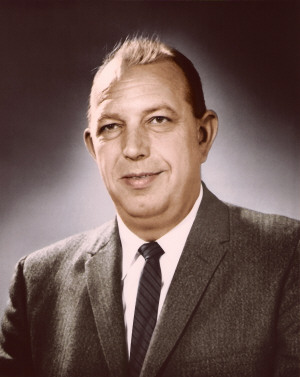| |
 Digital Scrapbook Digital Scrapbook
Lee Ross Capshaw was my father, my teacher, my mentor and my boss. He lived life exuberantly and music was his life.
Dad's youth was fraught with hardship. His family homes had no gas, electricity, plumbing or running water. Daddy's chores included milking the cows twice a day and working in the garden on Saturday. He said, "I don't recall kids in those days expecting anything but a good share of work during every day except Sunday."
Daddy considered his childhood musical experiences the most important events in his life next to his marriage. People often came to the Oklahoma home to make music-mostly hillbilly and country western. Daddy sold five of the chickens he had raised to buy a guitar. He played in the back room while the adults held forth in the front. The tiny school in Cardin and Commerce, Oklahoma provided surprisingly rich opportunities. Before high school, Daddy learned solfeggio, played violin, bassoon and an Albert system clarinet. He switched to the Boehm system clarinet during his ninth grade year. The band director allowed Daddy to practice during study hail. He practiced his clarinet and every other instrument he could get his hands on. The school band, orchestra, mixed choir, boys' choir and a jazz trio provided Ross Capshaw the foundation of his musical career.
In 1936, the Capshaw family moved to New Mexico where the depression was less severe. Daddy met and married my mother, Lucille. She played piano in his jazz combo. I was born in 1941 shortly before the United States entered World War II. Daddy joined the Navy in 1942. He fought in the Pacific as a radioman in a PBY squadron. When the war was over, our family lived in San Diego, where Dad worked in a music store learning sales and repair. He performed with several big bands in the area. The most notable was Jack McLean and his "Down Melody Lane" Orchestra. Randy was born on December 17, 1945.
We returned to New Mexico in 1947 where Daddy went to school on the GI Bill. Kenny, the baby in our family arrived this year. Dad supported the family by working as the janitor of the New Mexico Western music building, selling instruments for Hubbert Music Company and playing for dances on the weekends. Daddy graduated in 1950 with a 3.9 GPA.
We moved to El Paso where Ross Capshaw became the band director at El Paso High School. In this beautiful old school, Daddy began to impact the lives of thousands of young musicians and the musical community of El Paso. I remember spectacular half-time shows and concerts, which often featured an orchestral transcription such as "Italian in Algiers".
After a brief summer's employment for Hubbert Music Company, Daddy returned to teaching. He was my band director at Hillside and Hughey Elementary Schools. He could play every instrument proficiently. I remember the importance of scale study and the use of alternate fingerings to improve intonation
.
In 1955, Ross Capshaw became Supervisor of Instrumental Music. This title changed to Assistant Superintendent of Fine Arts and later to Director of Fine Arts. In this capacity, Daddy initiated daily scheduling of all instrumental music classes, which is in place to this day. He hired teachers who were performing musicians and thereby improved the quality of the El Paso Symphony tremendously. He conducted the All-City Band from 1955-60. Artists such as Raphael Mendez, Clifton Williams and Carmen Dragon came to perform with us.
As a boss, Dad was a formidable but fair taskmaster. He was a down to earth, common sense person who expected hard work from all the teachers. Daddy's example influences my teaching every day: "If you can't sing it, you can't play it." "Never give a free period." "Don't worry about contest. Teach the basics each day and contest will take care of itself."  |